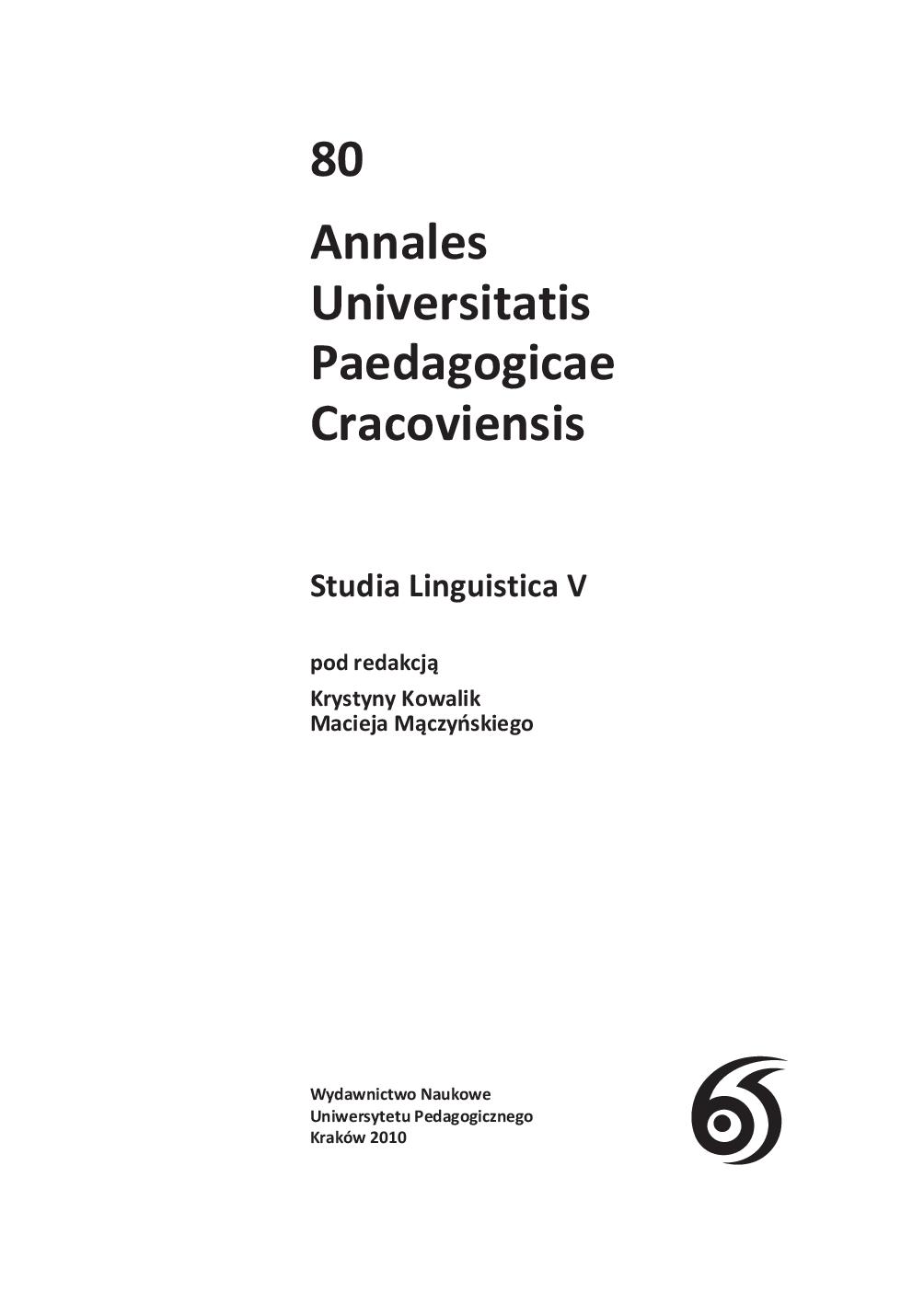Teksty informacyjne w mieście – perspektywa odbiorcy
Main Article Content
Abstract
the presence of texts in the city reality which are designed for collective receivers/recipients
(eg. sign-board, information advertising, price labels, etc.). In the research, the components
revealing descanting in the urban language (dialectal and sociolectal features) were found, as
well as the associated evaluation of objects and phenomena, colloquiality or even familiarity
of idea transfer, and free realisation of orthographic and stylistic norms. Urban texts bear
testimony of frequent language taboo breaking in the original sphere as well as in the area
violating tactfulness and politeness canons, up to violation of decency and modesty. In the
thesis, the changes in the sphere of native words meaning (neologisms and neosemantisms)
and examples of introducing allogenic lexemes (orientalisms) are discussed. The important
feature of the examples analysed is ambiguity, present in the lexical area as well as in the
global apprehension of the message, which could decide about the language game played
with receivers.
Downloads
Article Details
Author, submitting a text to the editorial board of the journal “Annales Universitatis Paedagogicae Cracoviensis. Studia Linguistica", certifies that the content of the article has not been published so far and that the work does not violate in any way the copyright or related rights of other person, as well as other rights of third parties, and that no one's rights to the work (or any part thereof) have been missed. After signing the contract, the property rights to the published materials are transferred to the Scientific Publisher of the University of the National Education Commission, Krakow.
“Annales Universitatis Paedagogicae Cracoviensis. Studia Linguistica” is an open access journal, and all its content is made available free of charge to users and institutions under the Creative Commons CC-BY-NC-ND 4.0 license (attribution, non-commercial use, no derivative works). Under this license, the authors agree that their work may be lawfully reused for any purpose, except for commercial purposes, without the prior consent of the author or publisher. Everyone can read, download, copy, print, distribute and process these works, provided that the author's marking and the original publication place are correct. Published texts may not be used to create derivative works (e.g. to translate and publish in another language without the consent of the publisher). This is in line with the BOAI (Budapest Open Access Initiative) definition. "Studia Linguistica" does not charge for submitting or processing articles.
References
Artawicz-Skowrońska, 2006, Język familijny – odmiana czy socjolekt?, [w:] Nowe zjawiska w języku, tekście i komunikacji, red. A. Naruszewicz-Duchlińska, M. Rutkowski, Olsztyn, s. 42–50.
Google Scholar
Awdiejew A., 1992, Wiedza potoczna a interferencja, [w:] Język a kultura, t. 5, s. 21–27.
Google Scholar
Beaugrande R., Dressler U.W., 1990, Wstęp do lingwistyki tekstu, przeł. M. Szwedek, Warszawa.
Google Scholar
Dubisz S., Karaś H., Kolis N., 1995, Dialekty i gwary polskie, Warszawa.
Google Scholar
Grabias S., 1997, Język w zachowaniach społecznych, Lublin.
Google Scholar
Gruszczyński W., 2001, Czaty w sieci, „Dialog”, nr 2, s. 138 i n. oraz przedruk Czaty w sieci, czyli o zwyczajach językowych w Internecie, 2001, [w:] Spotkania nie tylko literackie, Warszawa, s. 209–229.
Google Scholar
Grybosiowa A., 1998, Rozwój języków środowiskowych a reguły interpretacyjne tekstu, [w:] Tekst. Analizy i interpretacje, red. J. Bartmiński, B. Boniecka, Lublin, s. 100–107.
Google Scholar
Grzenia J., 2006, Język w Internecie, Warszawa.
Google Scholar
Lubaś W., 1983, Dialektologia miejska. Przedmiot. Zakres. Metody, „Język Polski”, R. 63, nr 4–5, s. 268–284.
Google Scholar
Lubaś S., 1990, Kultura językowa Polaków, [w:] Język – kultura – społeczeństwo. Wybór studiów i materiałów, red. S. Dubisz, Warszawa.
Google Scholar
Maćkiewicz J., 2000, Czy Polska jest częścią Europy? Polszczyzna w europejskiej lidze językowej, Kraków.
Google Scholar
Markowski A., Puzynina J., 2001, Kultura języka, [w:] Współczesny język polski, red. J. Bartmiński, Lublin, s. 49–71.
Google Scholar
Miodek J., 2001, O normie językowej, [w:] Współczesny język polski, red. J. Bartmiński, Lublin, s. 73–84.
Google Scholar
Nęcki Z., 1992, Komunikowanie interpersonalne, Kraków.
Google Scholar
Puzynina J., 1992, Język wartości, Warszawa.
Google Scholar
Skudrzykowa A., Urban K., 2000, Mały słownik terminów z zakresu socjolingwistyki i pragmatyki językowej, Kraków–Warszawa.
Google Scholar
Szczęsna E., 2004, Znak tekstowy w dyskursie kultury, [w:] Punkt widzenia w tekście i dyskursie, red. J. Bartmiński, S. Niebrzegowska-Bartmińska, R. Nycz, Lublin, s. 323–340.
Google Scholar
Urbańczyk S., 1962, Zarys dialektologii polskiej, Warszawa.
Google Scholar
Wilkoń A., 1987, Typologia odmian językowych współczesnej polszczyzny, Katowice.
Google Scholar
Witaszek-Samborska M., 2006, Innowacje obcego pochodzenia w słownictwie kulinarnym, [w:] Nowe zjawiska w języku, tekście i komunikacji, red. A. Naruszewicz-Duchlińska, M. RutWojtak M., 2007, Styl gatunku, styl gatunkowy a styl funkcjonalny w perspektywie analitycznej, [w:] Gatunki mowy i ich ewolucja, t. 3: Gatunek a odmiany funkcjonalne, red. D. Ostaszewska, Katowice, s. 16–24.
Google Scholar
